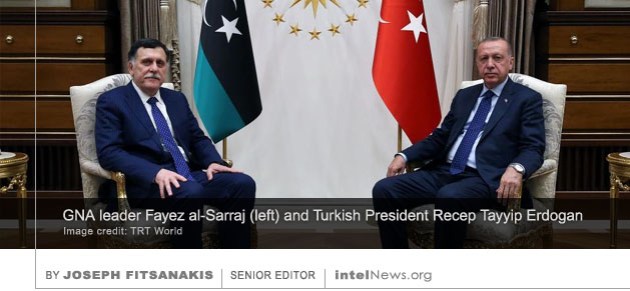Turkey offers to send troops to Libya as tensions rise with Greece, Egypt
December 11, 2019 1 Comment
 Turkish President Recep Tayyip Erdoğan has said his country is prepared to deploy troops to Libya, just days after Ankara surprised analysts by announcing an agreement with the embattled Libyan government in Tripoli. The Turkish-Libyan agreement has spurred angry reactions from Israel, Greece and Egypt, all of which are competing with Turkey for control of newly discovered gas fields in the eastern Mediterranean seabed.
Turkish President Recep Tayyip Erdoğan has said his country is prepared to deploy troops to Libya, just days after Ankara surprised analysts by announcing an agreement with the embattled Libyan government in Tripoli. The Turkish-Libyan agreement has spurred angry reactions from Israel, Greece and Egypt, all of which are competing with Turkey for control of newly discovered gas fields in the eastern Mediterranean seabed.
The Turkish-Libyan agreement merges the two countries’ Exclusive Economic Zones (EEZ) and ostensibly prevents other players in the area, including Greece, Egypt, Israel and Cyprus, from drilling for natural gas without the consent of Ankara and Tripoli. However, according to Greece, the agreement disregards the presence of several Greek islands —including the largest one, Crete— in the Turkish-Libyan EEZ. Athens says that it views the Turkish-Libyan agreement as a direct claim against its territory. Last week the Greek government summarily expelled the Libyan ambassador from the country, marking a dramatic deterioration in the historically close relationship between Athens and Tripoli.
To further-complicate matters, several European countries, as well as Russia and the United States, do not support the Tripoli-based Government of National Accord (GNA), with which Turkey has signed its agreement. Instead, they support the Libyan National Army (LNA), which is commanded by Field Marshal Khalifa Haftar, an old adversary of the Libyan leader Muammar al-Gaddafi. Haftar lived in the United States under Washington’s protection for several decades before returning to Libya in 2011. The LNA, which is based in eastern Libya, is also supported by Saudi Arabia, the United Arab Emirates, and other American allies in the Persian Gulf.
It follows that, if Turkey deploys troops to Libya, it may be entering a collision course with several of its North Atlantic Treaty Organization (NATO) allies. Ankara’s move will also be confronted by Russia, which is purported to have troops in eastern Libya. On Tuesday, however, Turkish President Erdoğan seemed determined to proceed with his plan. In a speech at a university in Ankara, the Turkish leader proclaimed that, “if Libya were to make a request, we would send a sufficient number of troops”, adding that “there is no hurdle” to doing so “after the signing of the security agreement” between Ankara and Tripoli.
This is the first time that Turkey has secured an agreement with a regional ally in the matter of energy exploration rights. Previously, Greece, Israel, Egypt and Cyprus struck a deal to coordinate their gas exploration activities, and eventually supply Europe with Israeli and Cypriot natural gas via a projected gas pipeline that would pass through Greece. But the Turkish move raises doubts about the prospects of such a project, with some analysts even speculating whether centuries-old rivals Greece and Turkey may be getting closer to war.
In a speech on Monday, Greek President Prokopis Pavlopoulos warned Ankara that “Greece will defend its borders [and] territory”. Meanwhile European Union leaders met on Monday behind closed doors to discuss the imposition of sanctions on Turkey as punishment for disputing the maritime territorial boundaries of Cyprus, a European Union member.
► Author: Joseph Fitsanakis | Date: 11 December 2019 | Permalink







The UN govt has furthered the mess that is in Libya AND they were not elected by the Libyan people. The UN does not understand the Middle East and if it continues to try an legislate using western ideals then it will hand Libya over to terrorists. In fact the security used by the UN govt is composed of Islamists and terrorists (Libyan Dawn) from the terror group that threw out the last elected government and likely assisted by the Muslim Brotherhood. That is enough to get rid of the UN govt and allow Gen Haftar and the last elected representative government now working out of Tobruk, to re-take their legal and elected control.